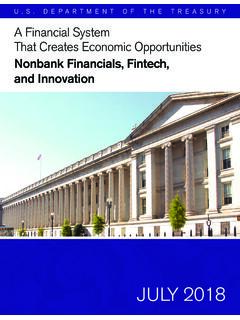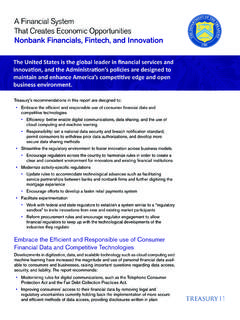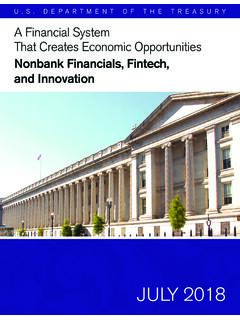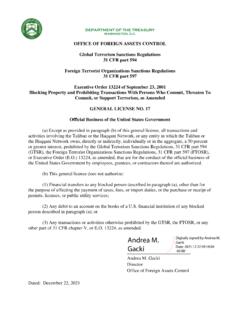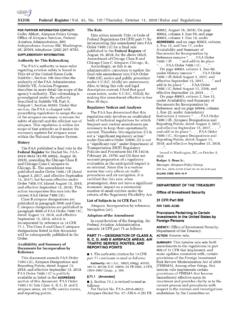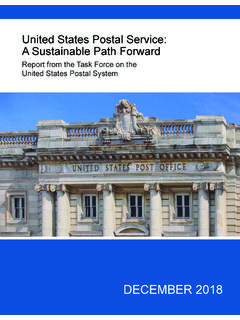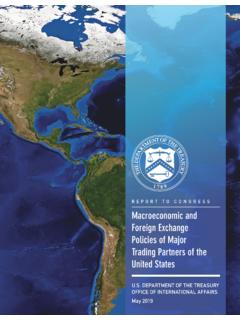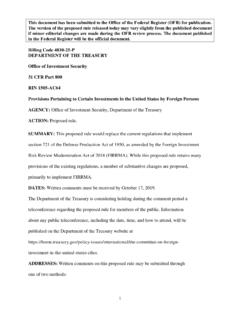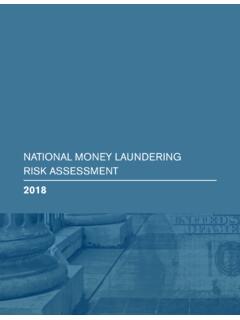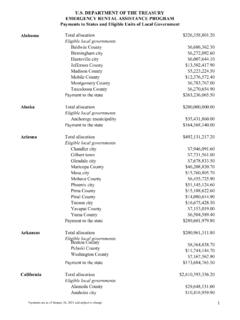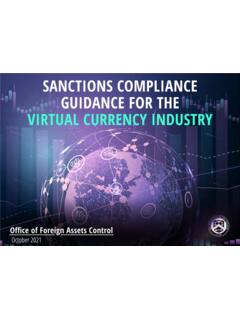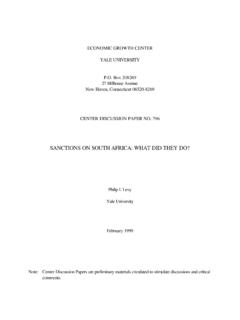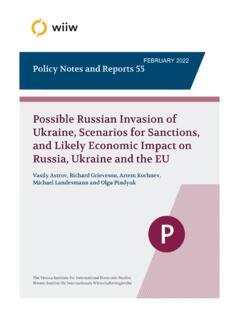Transcription of THE TREASURY 2021 SANCTIONS REVIEW
1 THE TREASURY 2021 SANCTIONS REVIEWO ctober 2021 THE TREASURY 2021 SANCTIONS REVIEW1 THE TREASURY 2021 SANCTIONS REVIEW1 After the September 11, 2001 attacks, economic and financial SANCTIONS ( SANCTIONS ) became a tool of first resort to address a range of threats to the national security, foreign policy, and economy of the United States. This tool rests on the formidable strength of, and trust in, the financial system and currency. At their core, SANCTIONS allow policymakers to impose a material cost on adversaries to deter or disrupt behavior that undermines national security and signal a clear policy stance. TREASURY s work on SANCTIONS is conducted in close partnership with other parts of the Executive Branch, in particular the Department of State and the National Security Council, which lead the formulation of the foreign policy and strategic goals that SANCTIONS serve, as well as the Department of Justice.
2 The Department of State also implements certain SANCTIONS authorities in consultation with the TREASURY . Over the last 20 years, the Department of the TREASURY ( TREASURY ), in close coordination with the Department of State, has successfully employed SANCTIONS to address various national security challenges, including: Preventing Iran from using the international financial system and commercial markets to generate revenue through oil sales and other activities that support its nuclear and ballistic missile proliferation and support for terrorist activities. These SANCTIONS pushed Iran to the negotiating table on its nuclear program in 2015. In coordination with and foreign law enforcement action, freezing2 and seizing billions of dollars in assets from front companies used by the Cali Cartel (at one point the world s largest drug trafficking organization), culminating in the 2014 dismantling of the cartel and the arrest and imprisonment of its leaders.
3 Protecting tens of billions of dollars in Libyan assets from misappropriation by former government officials following civil unrest and the fall of the Qadhafi regime in 2011. Designating over 1,600 terrorist entities and individuals since 9/11, targeting, exposing, and undermining terrorist groups and their operations. For example, SANCTIONS so significantly impaired Hizballah funding streams that in 2019 the organization had to reduce salaries for its military arm and media efforts and publicly solicit This document is explanatory only and does not have the force of law. It does not modify statutory authorities, Executive orders, regulations, or regulatory guidance. It is not intended to be, nor should it be interpreted as, comprehensive, or as imposing requirements under law, or otherwise addressing any requirements under applicable law. It is not intended to, and does not, create any right or benefit, substantive or procedural, enforceable at law or in equity by any party against the United States, its departments, agencies, or entities, its officers, employees, or agents, or any other The primary impact of adding individuals and entities to TREASURY s Office of Foreign Assets Control (OFAC) s List of Specially Designated Nationals and Blocked Persons ( the SDN List ) is that their property and interests in property are blocked.
4 When property is blocked (or frozen ), title to the blocked property remains with the owner of the property and any funds constituting or arising from blocked property must be placed into a blocked, interest-bearing account at a financial institution. Blocking immediately imposes an across-the-board prohibition against transfers or dealings of any kind with regard to the property. The exercise of powers and privileges normally associated with ownership of blocked property is prohibited without authorization from TREASURY 2021 SANCTIONS REVIEW2 When used effectively, SANCTIONS have the capacity to disrupt, deter, and prevent actions that undermine national security. However, the United States now faces new, emerging challenges to the efficacy of SANCTIONS as a national security tool: cybercriminals; strategic economic competitors; and a workforce and technical infrastructure under pressure from growing financial complexity and competing demands from policymakers, market participants, and others.
5 To ensure SANCTIONS continue to support national security objectives, the government must adapt and modernize the underlying operational architecture by which SANCTIONS are deployed. These changes are also needed to keep pace with the evolution of the global financial architecture, which has a profound impact on the efficacy of financial SANCTIONS . American adversaries and some allies are already reducing their use of the dollar and their exposure to the financial system more broadly in cross-border transactions. While such changes have multiple causes beyond financial SANCTIONS , we must be mindful of the risk that these trends could erode the effectiveness of our SANCTIONS . In addition, technological innovations such as digital currencies, alternative payment platforms, and new ways of hiding cross-border transactions all potentially reduce the efficacy of American SANCTIONS .
6 These technologies offer malign actors opportunities to hold and transfer funds outside the traditional dollar-based financial system. They also empower our adversaries seeking to build new financial and payments systems intended to diminish the dollar s global role. We are mindful of the risk that, if left unchecked, these digital assets and payments systems could harm the efficacy of our SANCTIONS . I do seriously think we have a responsibility to use SANCTIONS for important national security issues. But we need to think about the long-term impact on the global currency. - Former Secretary of the TREASURY Steven Mnuchin THE TREASURY 2021 SANCTIONS REVIEW3As part of a 2021 REVIEW of its economic and financial SANCTIONS , TREASURY met with individuals representing hundreds of SANCTIONS stakeholders, including Members of Congress and their staffs, interagency partners, the private sector, foreign governments, nongovernmental organizations, academics, and TREASURY s SANCTIONS workforce.
7 The REVIEW focused on two primary issues: (1) the framework guiding imposition of economic and financial SANCTIONS and (2) potential operational, structural, and procedural changes to improve TREASURY s ability to use SANCTIONS now and in the future. This REVIEW was neither an assessment of each of the 37 existing SANCTIONS programs3 administered and enforced by the Office of Foreign Assets Controls (OFAC), and the over 12,000 OFAC designations and nearly 3,000 OFAC delistings, nor a full examination of all economic statecraft tools. In addition, the REVIEW did not include separate SANCTIONS authorities implemented by the Department of State or other restrictive measures implemented by other Departments and Agencies, such as visa restrictions or export controls. The objective of this REVIEW was to ensure that economic and financial SANCTIONS remain an effective tool of national security and foreign policy now and in the future.
8 This report incorporates highlights from stakeholder perspectives as well as data and recommendations for improving TREASURY s implementation of SANCTIONS . It offers several steps to modernize SANCTIONS to address current policy priorities and keep the tool sufficiently nimble to address future threats. These steps include:3 There are multiple statutory or executive authorities (allowing for the imposition of SANCTIONS based on certain criteria) in each SANCTIONS program. SANCTIONS are most commonly issued pursuant to Presidential authorities that the President has delegated to TREASURY in certain scenarios. TREASURY implements those SANCTIONS pursuant to criteria provided in both the underlying statute and the relevant Presidential TREASURY 2021 SANCTIONS REVIEW4 Steps to Modernize Sanctions1. Adopting a structured policy framework that links SANCTIONS to a clear policy objectiveEconomic and financial SANCTIONS should be tied to clear, discrete objectives that are consistent with relevant Presidential guidance such as countering forces that fuel regional conflict, ending support to a specific violent organization or other malign and/or illicit activities, stopping the persecution of a minority group, curtailing nuclear proliferation activities, enhancing multilateral pressure, or ceasing specific instances of atrocities.
9 To accomplish this, TREASURY will adopt the use of a structured policy framework in order to inform its recommendations on the use of SANCTIONS . This framework should reflect key policy considerations and ask whether a SANCTIONS action: a) Supports a clear policy objective within a broader government strategy: SANCTIONS should be deployed alongside other measures as part of a larger strategy in support of specific policy ) Has been assessed to be the right tool for the circumstances: SANCTIONS should incorporate rigorous economic analysis, technical expertise, and intelligence to ensure that they are the right tool in our national security arsenal to pursue the identified ) Incorporates anticipated economic and political implications for the SANCTIONS target(s), economy, allies, and third parties and has been calibrated to mitigate unintended impacts: SANCTIONS should be designed to tailor their impact so that costs fall on intended targets and that potential negative impact on others is ) Includes a multilateral coordination and engagement strategy: Where possible, SANCTIONS should be coordinated with allies, incorporating shared intelligence and resources, and accompanied by engagement with relevant stakeholders including industry, financial institutions, allies, civil society, and the ) Will be easily understood, enforceable, and, where possible, reversible: SANCTIONS should be clearly communicated so that targets, allies, and others understand their specific objectives and the circumstances under which they may be escalated or reversed in response to the target s consistent application of this SANCTIONS policy framework will establish clear criteria for the use of SANCTIONS .
10 TREASURY should also seek to develop and implement an analytical construct to assess its SANCTIONS programs and actions systematically, incorporating this policy framework and building on existing evaluation efforts. The product of these assessments could be recommendations to augment, adapt, or wind down individual authorities or to list or delist particular individuals or entities. We must guard against the impulse to reach for SANCTIONS too lightly or in situations where they have negligible impact. Former Secretary of the TREASURY Jack LewTHE TREASURY 2021 SANCTIONS REVIEW52. Incorporating multilateral coordination, where possibleSanctions are most effective when coordinated as an Administration with allies and partners who can magnify economic and political impact. This coordination also enhances the credibility of international leadership and shared policy or security goals of the United States and its allies.
